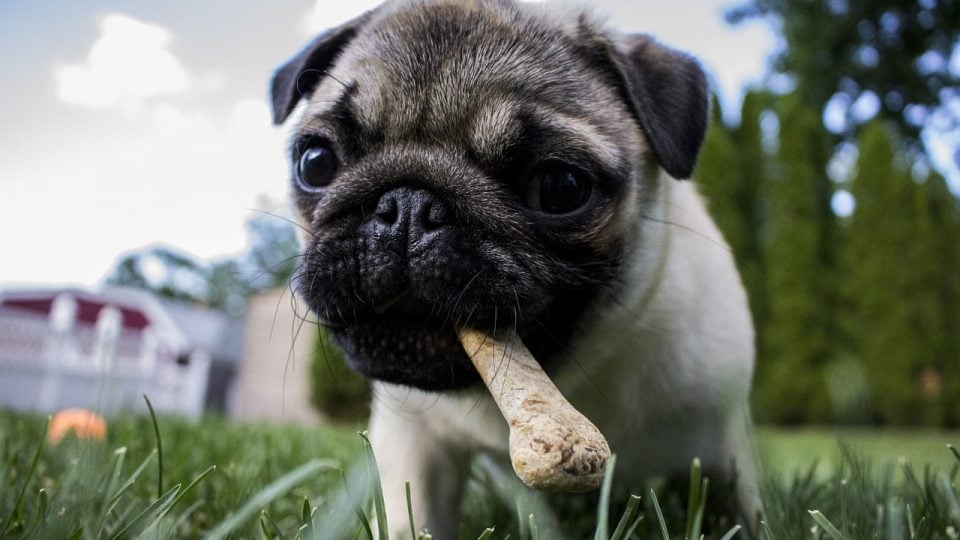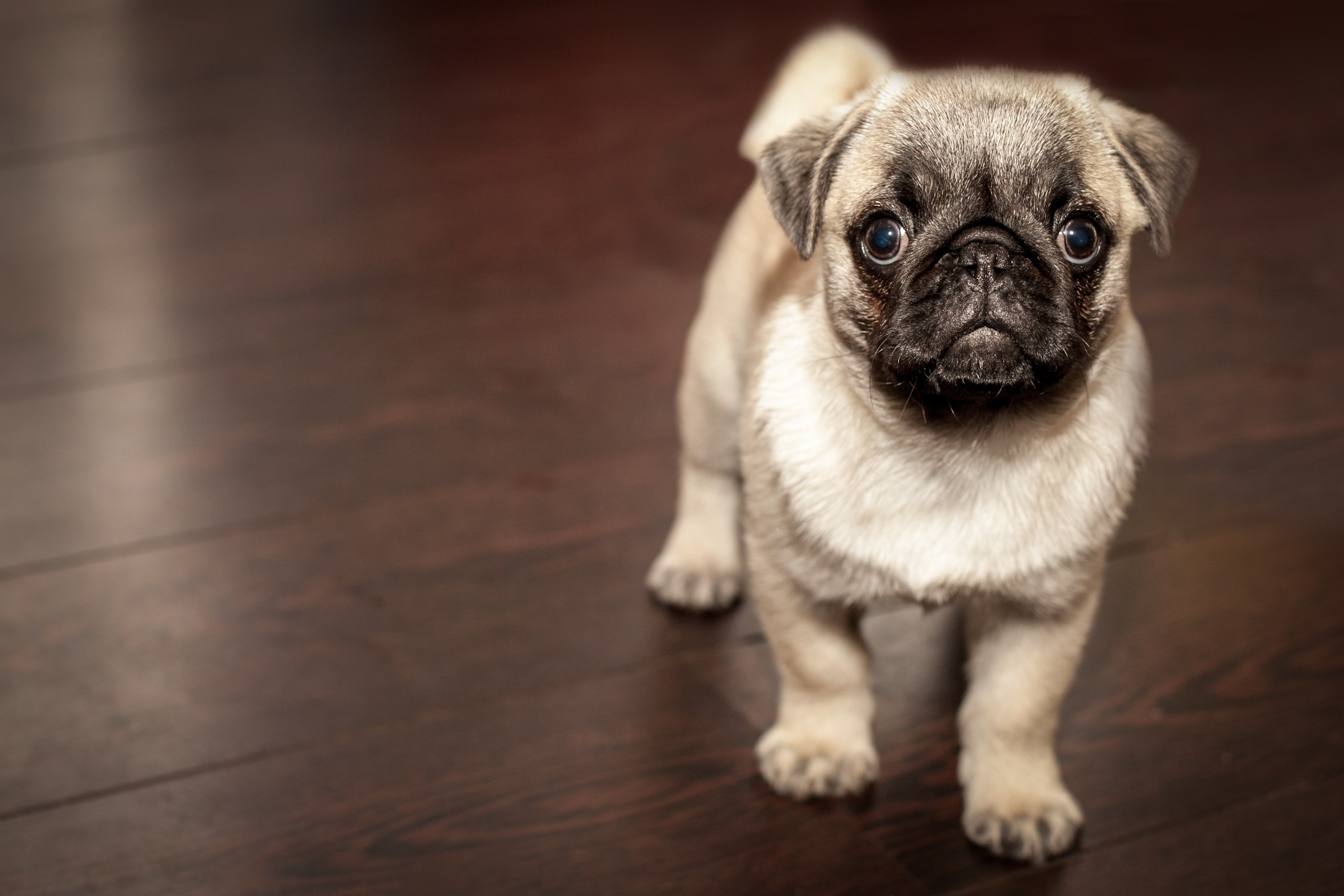Curious by nature, Pugs have human-like expressions written all over their faces. When they’re puppies, Pugs love to play with toys or insist upon some serious nap time. Finding a perfect Pug puppy shouldn’t be too difficult, as this breed is well-known for their spunky and human-loving attitude. Get the scoop on Pug puppies below!
Over 2,000 years ago, Pugs and other flat-faced dogs were coveted by royalty in China. Along with the Pekingese and Shih Tzu, Pugs were highly sought after and were often given as gifts to subjects of the royal court.
In the 1600s, Dutch traders brought Pugs back to Europe. Prince William from Holland famously loved his Pug, Pompey, and Queen Victoria II fawned over her Pug named Basco. They often were adorably depicted in many 18th-century portraits with their owners.
Nowadays, Pugs take the world by storm. Otis from the movie Adventures of Milo and Otis has graced most of our screens, and who can forget wise-cracking Frank from Men in Black? Pugs are guaranteed to brighten up any room with their bombastic personality.
Pug Puppy Facts
From the laps of royalty to many households worldwide, the Pug is one exceptional dog. Here are some important Pug puppy facts to consider before bringing your new family member home.
| Size | Small. Height reaches 25-33 cm (10-13 inches) and weight is 6-8 kg (14-18 pounds) |
| Breed Characteristics | Pugs have large dark brown eyes and a signature wrinkled brow that keeps you guessing. Their coats are smooth, short and generally come in three different colours: apricot-fawn (a tannish hue), silver, or black. All three variations are accompanied by a black face mask. Their stout bodies and curlicue tail are one of the many reasons why the public loves these dogs’ distinct look. |
| Temperament | Pugs are very curious and can’t help but discover new things to do. They are also especially interested in food. Due to their stature and tendency to overeat, Pugs can be easily prone to gaining weight. Be sure not to overfeed your Pug and exercise them regularly, as their expressive eyes may tell you they’re starving when they’re in fact not! |
| Grooming and Health Needs | Pugs shed and would do best with a weekly brushing from a rubber grooming mitt or a medium-bristle brush. Their coat is short, however, so they do not need professional grooming often. A Pug’s nails need to be cut regularly, especially if they’re a city dog, as they don’t get many opportunities to file them down themselves by digging.
Sadly, they can be prone to some health risks. They run the risk of developing corneal ulcers and dry eyes due to their small skulls and flat faces. This can also cause breathing issues, including brachycephalic obstructive airway syndrome (BOAS), which can require surgery. As a result, they do best in moderate weather; otherwise, the heat or humidity can amplify breathing problems. |
| Training | Pugs are people pleasers. They’re unhappy if they do something wrong, and so this means some Pugs are easy to train. This also means harsher training methods will only frighten a Pug. Early socialisation classes are ideal for this breed, as their curious nature might get them into trouble if they don’t know how to behave with other dogs. |
| Energy Level | Pugs love to snuggle. They are tried and true lap dogs, and if they had it their way it would be a snooze-fest all day long. That paired with their insatiable appetite means Pugs need walks and play time to build up their stamina on a daily basis. |
| Life Span | Pugs live between 13 – 15 years on average. |

Darby from @ThatPugDarby
Who Is The Best Human For A Pug?
A country or a city dog, Pug owners pride themselves on knowing their pooch is built for both. Pugs are versatile and are content to be the only dog in the household or part of a pack. Pugs aren’t built for speed, so having a family that loves to watch Netflix versus training for a marathon is ideal for this affectionate and lower-energy breed.
Getting A Pug Puppy
Choosing to adopt or go through a breeder for your new Pug puppy is a personal choice that requires research. Thankfully, there are many resources out there to help you find a rescue or breeder that offers healthy, ethically-sourced Pug puppies.
Knowing what you’re in for when you get a Pug puppy is an important step in being a responsible pet owner. Whether you find a responsible breeder or are planning on adopting, it’s up to you to be prepared for an energetic and friendly addition to your household.
Adopting Pug puppies
It may be surprising to know, but adopting a Pug puppy is possible.
Dogs are given up for all kinds of reasons including a change in lifestyle or the breed not being a good fit. What this means for you: there may be adoptable purebred dogs and puppies out there who are looking for a new forever home.
The main difference between a breeder and a rescue charity is that the latter may not always have young puppies to choose from. But the benefits of adopting an older dog normally include them being neutered and, often, they’re already housetrained. You may also find a Pug mix that has all the traits you want from the breed, but with a little extra thrown in.
Finding a Pug rescue can be as simple as searching the internet. Rescues such as The Pug Dog Welfare and Rescue Association are a good starting point, as are the many non-breed-specific rehoming charities up and down the UK.
Finding a Pug breeder
The first step is to do your research. Sadly, there are many puppy mills posing as reputable breeders along with many online scams. Be aware, and reach out to different online forums for conversations about getting your future furry family member.
Be sure to ask questions, make arrangements to meet the parent dogs or mother, and follow your gut. If something seems wrong at a breeder you visit or the Pug puppy seems too good to be true, there’s likely something fishy going on. The Kennel Club has resources that will help you find a responsible, ethical breeder and avoid puppy farms.
Pug Puppy Resources
After you find the right Pug puppy, it’s time to prepare your home! Here are a few resources to get you started:






